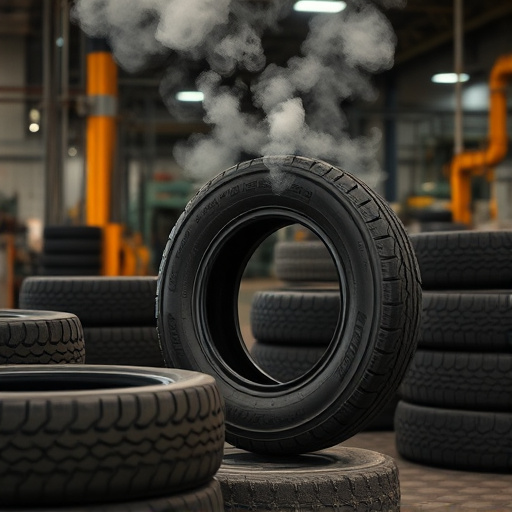
Tyre factories pose significant environmental and health risks through their rubber production processes, emitting harmful pollutants like Volatile Organic Compounds (VOCs) and Particulate Matter. These emissions contribute to air quality degradation, posing threats such as respiratory issues and cardiovascular diseases. To mitigate these effects, the industry is transitioning towards eco-friendly tyre production methods, focusing on cleaner technologies, sustainable rubber sources, and improved recycling practices. This shift aims to reduce VOCs and particulate matter, enhance air quality, and foster a greener, more sustainable rubber industry while addressing the health risks associated with industrial pollution.
Emissions from Tyre Factories: Unraveling the Environmental Impact
Tyre pollution is a growing concern in the global struggle for cleaner air and sustainable manufacturing. This article delves into the environmental footprint of tyre factories, focusing on the impact of their emissions on air quality. From rubber production processes to the release of volatile organic compounds (VOCs) and particulate matter, we explore the health risks associated with tyre pollution. Additionally, it highlights current emission control measures and offers a glimpse into future strategies for reduction, while also introducing eco-friendly tyres as a potential solution.
- Understanding Tyre Factory Emissions: A Look at Rubber Production Processes and Their Environmental Footprint
- The Impact on Air Quality: VOCs, Particulate Matter, and the Health Risks Associated with Tyre Pollution
- Navigating Industrial Pollution: Current Control Measures and Future Directions for Emission Reduction in Tyre Factories
- Eco-Friendly Tyres as a Solution: Exploring Sustainable Alternatives and Their Role in Mitigating Environmental Impacts
Understanding Tyre Factory Emissions: A Look at Rubber Production Processes and Their Environmental Footprint

Tyre factories, through their rubber production processes, generate a range of emissions that contribute to both air and environmental pollution. The primary concerns include Volatile Organic Compounds (VOCs) and particulate matter, which have significant health risks associated with them. During rubber production, various chemicals are used and released into the atmosphere, leading to poor air quality and potential ecological damage.
VOCs, such as benzene and toluene, are known carcinogens and can cause respiratory issues. Particulate matter, both fine and coarse, can penetrate deep into the lungs, posing additional health hazards. To mitigate these impacts, tyre manufacturers are increasingly focusing on emission control technologies and exploring options for eco-friendly tyres. This shift includes adopting cleaner production methods, improving recycling practices, and developing sustainable rubber sources to reduce the overall environmental footprint of tyre manufacturing.
The Impact on Air Quality: VOCs, Particulate Matter, and the Health Risks Associated with Tyre Pollution

Tyre factories emit a range of pollutants that significantly impact air quality and contribute to industrial pollution. Volatile Organic Compounds (VOCs) are one such concern, as they include toxic chemicals like benzene, toluene, and formaldehyde, which can cause respiratory issues and even cancer. These compounds contribute to the formation of ground-level ozone, a major component of smog, further exacerbating air quality problems.
Particulate Matter (PM) is another critical aspect of tyre pollution. PM2.5 and PM10 particles, originating from rubber production processes, can penetrate deep into the lungs, leading to various health risks. Short-term effects include respiratory irritation and aggravation of asthma, while long-term exposure may result in chronic obstructive pulmonary disease (COPD) and cardiovascular issues. Emission control measures, such as implementing eco-friendly tyre production methods and stringent factory regulations, are essential to mitigate these health risks associated with industrial tyre pollution.
Navigating Industrial Pollution: Current Control Measures and Future Directions for Emission Reduction in Tyre Factories

Navigating Industrial Pollution: Current Control Measures and Future Directions for Emission Reduction in Tyre Factories
The rubber production process, while vital to numerous industries, contributes significantly to tyre pollution and industrial pollution as a whole. Tyre factories emit various pollutants, with Volatile Organic Compounds (VOCs) and Particulate Matter (PM) being the primary concerns due to their severe air quality impact and health risks. Currently, many factories employ standard emission control technologies like scrubbers and filters to mitigate these issues. However, these methods primarily address existing problems without tackling the fundamental sustainability challenges.
Looking ahead, the future of tyre factory emissions control lies in adopting eco-friendly production processes and materials. Innovations such as green rubber technologies and advanced recycling methods promise to reduce VOCs and PM emissions during rubber production. Additionally, transitioning towards more sustainable practices, including the development of eco-friendly tyres, can significantly lower overall environmental impacts. These future directions not only enhance air quality but also drive the industry towards a greener, more sustainable path.
Eco-Friendly Tyres as a Solution: Exploring Sustainable Alternatives and Their Role in Mitigating Environmental Impacts

In the face of growing environmental concerns, exploring sustainable alternatives to conventional tyre production has become imperative. Eco-friendly tyres offer a promising solution to combat tyre pollution and its associated health risks. These innovative products are designed with a reduced carbon footprint in mind, aiming to mitigate the significant impact of factory emissions on air quality.
The manufacturing process of eco-friendly tyres focuses on minimizing volatile organic compounds (VOCs) and particulate matter, both major contributors to industrial pollution. By adopting advanced emission control technologies and sustainable raw materials, such as natural rubber and recycled tyre components, manufacturers can reduce the environmental footprint of rubber production. This shift towards greener practices not only improves air quality but also contributes to a circular economy by decreasing waste and dependency on finite resources.
The multifaceted issue of tyre pollution, stemming from both rubber production and factory emissions, poses significant challenges to air quality and human health. While current control measures have had some success in mitigating industrial pollution, the need for further emission reduction strategies is clear. Eco-friendly tyres emerge as a promising solution, offering sustainable alternatives that could help minimise environmental impacts and contribute to a greener future. By exploring innovative materials, production methods, and stringent emission control technologies, the tyre industry has an opportunity to revolutionise its environmental footprint and address the pressing concerns surrounding tyre pollution.





